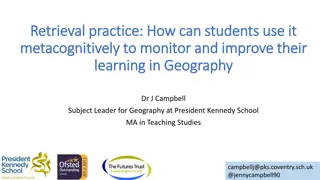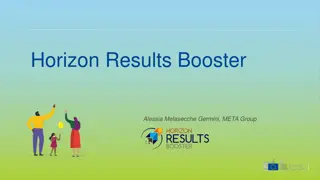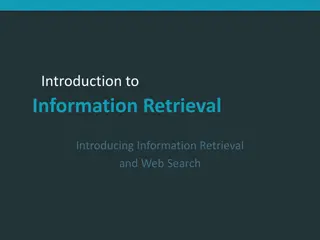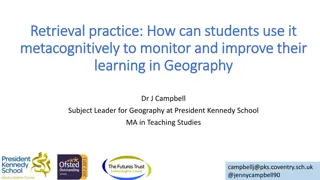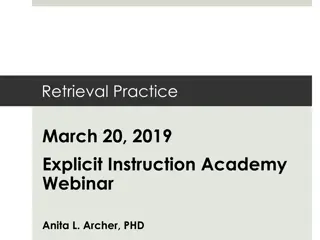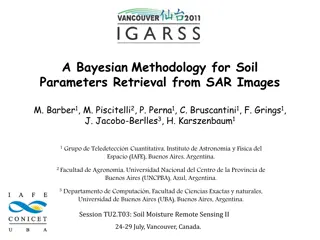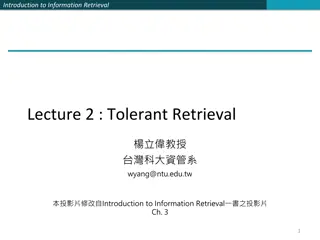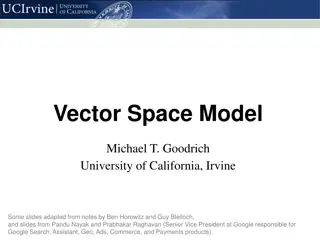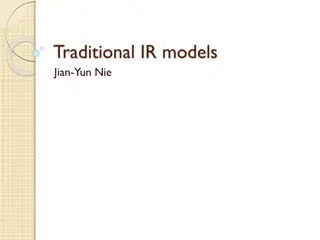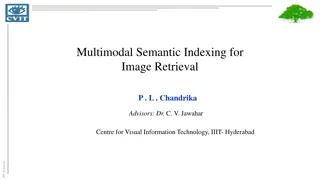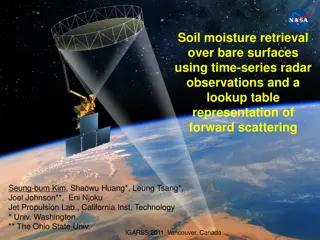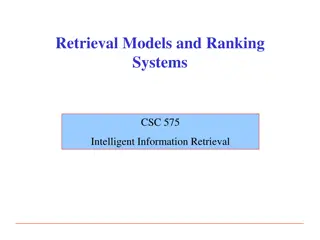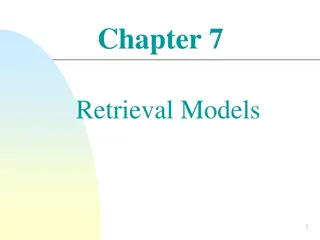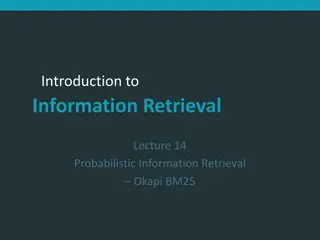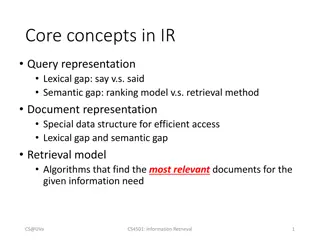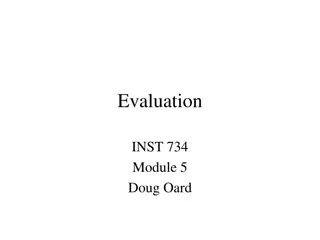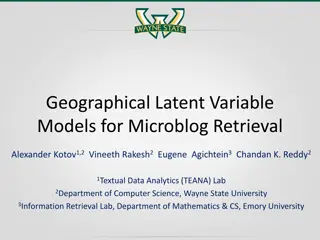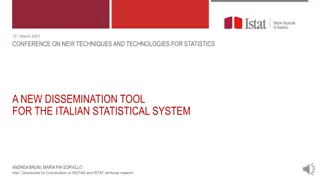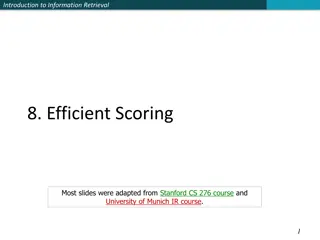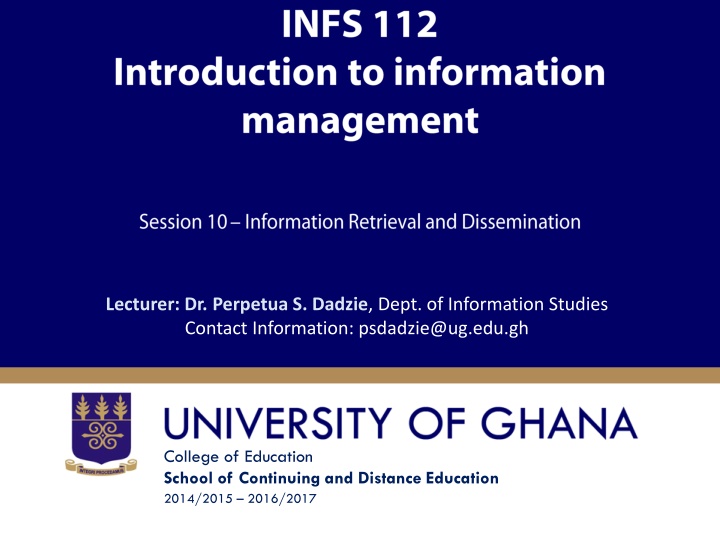
Information Retrieval Tools and Dissemination Overview
Explore the session led by Dr. Perpetua S. Dadzie focusing on manual and electronic retrieval tools, along with the importance of information dissemination. Discover the key topics covered, types of tools explained, and insights shared to enhance understanding in the field of information studies.
Download Presentation

Please find below an Image/Link to download the presentation.
The content on the website is provided AS IS for your information and personal use only. It may not be sold, licensed, or shared on other websites without obtaining consent from the author. If you encounter any issues during the download, it is possible that the publisher has removed the file from their server.
You are allowed to download the files provided on this website for personal or commercial use, subject to the condition that they are used lawfully. All files are the property of their respective owners.
The content on the website is provided AS IS for your information and personal use only. It may not be sold, licensed, or shared on other websites without obtaining consent from the author.
E N D
Presentation Transcript
Lecturer: Dr. Perpetua S. Dadzie, Dept. of Information Studies Contact Information: psdadzie@ug.edu.gh College of Education School of Continuing and Distance Education 2014/2015 2016/2017
Session Overview At the end of the session, the student will be able to: Explain the types of information retrieval tools Explain importance of information dissemination Slide 2 Dr. Perpetua Dadzie, Dept of Information Studies
Session Outline The key topics to be covered in the session are as follows: Topic One - Manual Retrieval Tools Topic Two Electronic Retrieval Tools Topic Three Information Dissemination Slide 3 Dr. Perpetua Dadzie, Dept of Information Studies
Reading List Slide 4 Dr. Perpetua Dadzie, Dept of Information Studies
Topic One MANUAL RETRIEVAL TOOLS Slide 5 Dr. Perpetua Dadzie, Dept of Information Studies
Manual Retrieval tools Two types of Information Retrieval tools: Manual and Electronic Manual tools: Catalogues, bibliographies, indexes, abstracts, thesaurus, directories. Electronic tools: CD ROM, Online retrieval services, Databases, websites, subject directories etc. The Catalogue contains bibliographic printed on cards; known as card catalogue. Today information captured in machine readable form called Online Public Access Catalog (OPAC)
Manual Retrieval tools (2) Card catalogue 3 major access points : Author index alphabetical arrangement of author s surname Title index alphabetical arrangement of titles of materials within collection Subject index alphabetical lists of subjects covered by library User can search using author, title and subject indexes ; Subject entries done with lists such as Library of Congress Subject Headings or Sears List of Subject Headings.
Manual Retrieval tools (3) Two basic types of catalogues Classified catalogue entries arranged by some recognized system of classification symbol; Dictionary catalogue arrangement in one straight forward alphabetical sequence. Classification - arrangement of knowledge in logical order. Classification Scheme General or Special General schemes used in public, academic, national libraries ex. Library of Congress (LC), Dewey Decimal Classification (DDC)
Manual Retrieval tools (4) The Catalogue Special schemes restricted areas of knowledge such as education, law, chemistry etc Schemes adopt symbols as class marks to represent classes and divisions; symbols known as notation represents subjects and relationships; use numbers or letters or both Some Notation in DDC 000 Generalities 100 Philosophy and related disciples 200 Religion 300 Social Sciences
Manual Retrieval tools (5) Some Notation in LC Class H Social Science Class J Political Science Class K Law Class L Education Class M Music Indexes alphabetical list of names, subjects, etc., with references to places where they occur; something that serves to guide, point out, or otherwise facilitate reference Types - author index, title index, subject index
Manual Retrieval tools (6) Some Notation in LC Class H Social Science Class J Political Science Class K Law Class L Education Class M Music Indexes alphabetical list of names, subjects, etc., with references to places where they occur; something that serves to guide, point out, or otherwise facilitate reference Types - author index, title index, subject index
Manual Retrieval tools (7) Subject indexing deciding what document is about and translating conceptual analysis into index terms which act as identifier for subject matter of document Index term must be controlled for retrieval purposes; thus controlled vocabulary Controlled vocabulary list of approved terms from which indexer must select Cross references to facilitate retrieval of groups of like documents, semantically related.
Manual Retrieval tools (8) Search file or index created - physical form such as printed book, catalogue cards, magnetic tape or disk; or by method of file organization eg. Alphabetical, classified Index useful as reduces number of documents to consult after a search
Video Info. Literacy 5. Using a library catalog <iframe width="420" height="315" src="https://www.youtube.com/embed/6WHRA0Ne 3I0" frameborder="0" allowfullscreen></iframe>
Activity Visit any library and use their catalogue to find information on any author of your choice; the number of books written, the subject areas. You are expected to use author, title and subject indexes
Topic Two ELECTRONIC RETRIEVAL TOOLS Slide 16 Dr. Perpetua Dadzie, Dept of Information Studies
Electronic Retrieval tools Information is stored electronically on different media eg Online information retrieval, CD ROM, RAM, Databases Online information retrieval eg Dialog, OCLC - involve searching remotely located databases with help of computers and communication channels. Online search services assessed after payment of subscription fees through examples:
Electronic Retrieval tools (2) Online information retrieval . OCLC First Search (http://www.oclc.org/firstsearch) provides access to core collection of reference databases. Includes WorldCat, CAMIO, Electronic Books and OASIster Full text journals and books: EBSCO Information Service (http://www.ebsco.com). Provides access to large collection of full text and bibliographic databases
Electronic Retrieval tools (3) ProQuest (http://proquest.com/about) contains millions of articles originally published in magazines, newspapers and journals
Electronic Retrieval tools (4) Basic steps in online search Study search topic, develop clear understanding of information requirement Get access to online search service Login in to service provider Select appropriate database Formulate search question Select appropriate format for display Reformulate your query if necessary Select mode of delivery; download records online to send offline request
Electronic Retrieval tools (5) CD ROM retrieval CD ROM - optical storage devices which allow users to view collection of files; allow users certain common search features such as: Keywords search - user conduct search with one or more keywords Phrase search - multiple word phrases searched Boolean search search operators AND, OR, Not used for searching Truncation shortening word or eliminating some characters from longer term to pick up variants. Left, right and middle truncation exist
Electronic Retrieval tools (6) Index and /thesaurus support indexes allow users to select search terms or phrase from term index; thesaurus allows users to get map of chosen terms in order to widen or narrow down given search
Electronic Retrieval tools (7) Web information Retrieval URL (Uniform Resource Location) address of website eg. UG go to URL http://www.ug.edu.gh Search engines search terms, keywords/phrases that are run against database containing information on web pages collected automatically by programs called spiders; Ex. Google (http://www.google.com) Altavista (http://www.searchalta.com) Ask Jeeves (http://www.askjeeves.com)
Electronic Retrieval tools (8) Web information Retrieval .. Meta search engines search more than one search engine at a go. Ex. Dogpile (http://www.dogpile.com); Metacrawler (http://www.metacrawler.com) Just like CD ROM, search engines can perform keyword, phrase, proximity searches Subject directories human-selected Internet resources arranged and classified in hierarchical topics. Ex
Electronic Retrieval tools (9) Subject Directories . Beaucoup http://www.beaucoup.com Yahoo.com https://www.yahoo.com/ Information Gateway Retrieval - Communications service which provides single point of access to networks such as Internet. Ex INTUTE: Social Sciences (http://www.esrc.ac.uk/research/data/intute.aspx provides access to a selected source of relevant, high- quality internet resources for social science researchers, academics and practitioners.
Activity Get access to the Internet and search all websites listed in this session
Topic Three INFORMATION DISSEMINATION TOOLS Slide 27 Dr. Perpetua Dadzie, Dept of Information Studies
Information dissemination Information dissemination creates awareness of products and services, improves knowledge base of users, enable users make better decisions, provide feedback for administrators Two types: Current Awareness Service (CAS) and Selective Dissemination of Information (SDI). Current Awareness Service keeping up-to-date with information about recent developments, particularly those in a researcher s own subject field Alerting service informs user about what is being published in area of interest CAS offered at two levels personalized and general.
Information dissemination (2) Personalized level user approaches library, select and collect relevant information from catalogues, books, periodicals, bibliographies, indexes etc General level implementation of well planned information service design made from time to time Ex of CAS announcement of titles recently acquired, contents list of periodicals, relevant indexes and abstracts from secondary periodicals and digests, In-house CAS provided in form of Information Bulletin
Information dissemination (3) Bulletin may include Bibliographic citation of books author s name, title, year, subject List of periodical articles under authors arranged by specific subject areas indicating title of journals, vol. no. issue number ,dates, page nos. Subject index, keywords Keyword index or descriptors Subject-wise list of pamphlets, reports, thesis, dissertations, fieldwork, survey reports, etc
Information dissemination (4) Selective Dissemination of Information personalized information service intended for selected users of high priority group Users usually research or R & D personnel who require carefully selected information for specific purposes Email, electronic bulletin board, CD ROM essential for SDI services Two profiles created user profile, document profile
Information dissemination (5) User profile comprises identity of SDI user and subject interests on specific areas of research or investigation. User identity include name, address, telephone nos, email and other communication means Subject profile technical terms significant to query of user List of significant terms or keywords to determine areas of interest
Information dissemination (6) Information specialist/library designs or constructs individual search profiles for SDI service Users search profile may change from time to time Document profiles consists of: Bibliographic and non bibliographic information in machine readable form; External databases Selection of searchable files Storing information for individual user in mailbox
References ******

